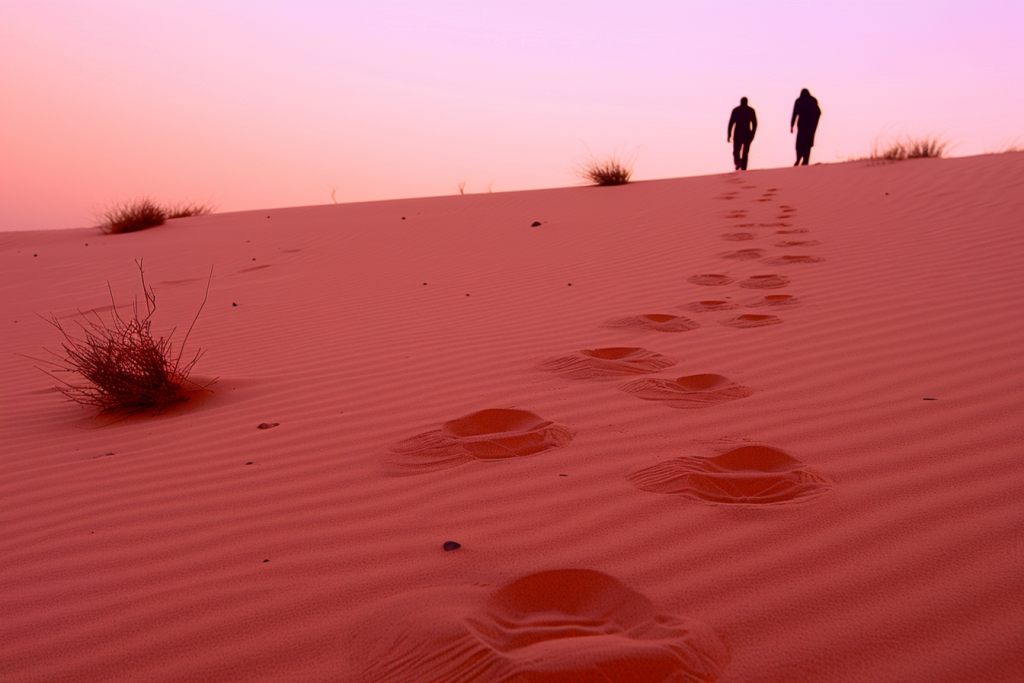November 23, 2025 • By Amagyei Anim • Category: Excerpts

The sun rose like a punishment that morning. It felt heavier than the day before, almost as if the sky wanted to remind us that we were guests in a land that did not care whether we lived or died. For three days we had walked through sand that swallowed our ankles and tested our faith. Every step pulled something out of us. Strength. Hope. Memory. Even the stubborn pride that brought us into the desert began to melt under the heat.
We carried one bottle of water among the five of us. It was a small blue plastic bottle that looked almost foolish in a place that stretched endlessly in every direction. We passed it around quietly, each man taking only a sip and pretending it was enough. No one wanted to be the one who finished it. The bottle became a symbol of our stubbornness to stay alive, and none of us was ready to let go of that.
People imagine the desert as an empty place. Silence. Stillness. A flat stretch of nothing. That is not the truth. The desert is alive. It whispers. It traps your thoughts. It asks questions you are not ready to face. When the wind blows, it feels like someone is speaking close to your ear, telling you to lie down, rest a bit, close your eyes. But migrants know that sleep in the desert is a kind of death. So we kept moving with our heads bent forward like men walking into a storm.
On the first night, we still had laughter. It was weak and dry, but it reminded us of home. Musa joked that the sun was practicing for Judgment Day. Kofi said that if he survived this, he would never complain about Ghanaian heat again. Even though our voices cracked, we laughed because laughter felt like a small rebellion.
On the second night, the laughter faded. Hope tried its best, but it had grown thin. We walked without speaking. Every man carried his own private fears. Some of us prayed silently. Some whispered the names of their mothers. Some imagined the European cities waiting at the end of this road. Lights. Streets. Order. Paychecks. A chance. Something better than the life we had left behind.
By the third day, the desert had peeled away everything soft in us. Our feet burned. Our lips cracked. Our eyes stung whenever the wind kicked sand into our faces. No one talked anymore. We only listened to the sound of our breathing and the rhythm of our steps. Sometimes, one of us stopped to catch a breath. Sometimes, someone stumbled. But we always helped each other back up. The bond of survival became stronger than friendship.
Along the way we met others. Some were from Gambia. Some from Niger. Some from Nigeria. A few joined our group. A few turned back. And some could not go on. Those who fell asked us to greet their families. We promised. Migrants make promises in the desert that they carry forever.
There was a moment when Musa asked to lie down for just a few minutes. He said he needed to rest his back. We knew what that meant. When a man sits in the desert, he is halfway gone. I knelt in front of him and held his face with both hands. His skin was burning. His eyes were red. I told him that he would not die here. I told him we would get out together. I told him that the desert had taken enough of our people. He looked at me for a long time before nodding slowly. Then we lifted him up and continued walking.
When the pickup truck finally appeared on the horizon, it did not look real. It shimmered like a mirage. For a moment we did not trust our eyes. But the sound of the engine grew louder, and the shape became clearer. It was old and dented, but to us it looked like salvation. We wanted to run toward it, yet our legs refused. By then our bodies had forgotten how to run.
The driver shouted that he could only take a few of us. Men scrambled. Some cried. Some begged. But by the grace of God, we managed to climb onto the back of the truck. The metal was hot enough to burn our palms, yet we held on. None of us complained. None of us wanted the driver to change his mind.
As the truck pulled away, I looked back at the desert. It stretched into the distance like a giant beast, patient and hungry. It had not killed us, but it had changed us. It had carved lessons into our bones. Resilience. Brotherhood. Caution. Gratitude. The understanding that life can be fragile and strong at the same time.
The desert taught us that every migrant carries two shadows. One is the man you used to be. The other is the man you hope to become.
We were not the same people who entered that desert. We had shed our innocence. We had buried our fears. And as the truck bounced over the dunes and moved us into another chapter of the journey, I whispered a promise to myself.
If I ever made it to the other side of this dream, I would tell this story. Not for pity. Not for glory. But for truth. Because the world hears about the migrants who arrive, and the world hears about the migrants who die, but almost no one hears about the ones who walk through fire and survive.
This is only one crossing.
One chapter.
One memory in a long chain of memories.
But for us, it was the line between life as it was and life as it could be.
